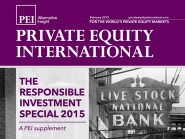
Private Equity International – The Responsible Investment Special 2015
The ESG imperative
One interesting fact about private equity is that it hasn’t emerged from the financial crisis with a better reputation. It should have.
Financially, the asset class held up well in the post-Lehman years, and proved itself resilient under pressure. There have been losses, but the evidence suggests that many funds invested during ’06 and ’07 managed to avoid disaster. The case can be made that, relative to other investment classes, private equity’s recent record has been rather respectable throughout.
It is worth noting too that private equity is still a largely scandal-free part of the financial world. Corporate misdemeanour and whitecollar crime have been rampant elsewhere, perpetrated in particular by banks and rogue operators in the hedge fund world. Private equity firms on the other hand can by and large assert that they’ve played by the rules, steered clear of defrauding their investors and made sure their portfolio companies kept their noses out of trouble, too.
This isn’t just accidental. Private equity is an industry that likes to pat itself on the back for being good at aligning interest and exerting effective governance over the businesses it owns and, again speaking generally, that isn’t preposterous: PE really does do these things well. Only it doesn’t get much credit for them from the outside world.
The point about this last fact is to try and change it, because hostility from significant others makes it difficult for private equity to operate. The industry’s embrace of responsible investment practices, as documented in this latest PEI supplement on the subject, reflects a growing recognition that the ESG imperative has real power. Private equity firms have come to understand that committing to ESG excellence, and adopting compatible business processes, can achieve immensely profitable outcomes – morally, reputationally, and above all in terms of higher money multiples and better IRRs.
Last year, in a speech given at PEI’s Responsible Investment Forum (see p. 28), TPG cofounder Jim Coulter made the point that private equity, because of its frequent role as the controlling shareholder, is better positioned than any other type of investor to get its investees to do the right things. He is right about that, and a growing number of managers are acting accordingly. On p. 6 and p. 12 respectively, in-house sustainability specialists at Actis and Doughty Hanson explain how ESG practices have become integrated into their firms’ investment processes. On p. 16, environmental due diligence specialists ERM share their experience of how and why the industry should invest in RI capabilities. We also looked at how limited partners are influencing the agenda (p. 10) and were reminded that some of them, but not all, are being very influential indeed.
Needless to say there is a lot more the industry must do to fully harness the ESG opportunity. But plenty of groundwork has now been done, the days of mere lip-service are behind us. To finish the project will help the industry safe-guard a long-term profitable future, and who knows – it may even enable it to confound the critics.
Enjoy the supplement,
Philip Borel